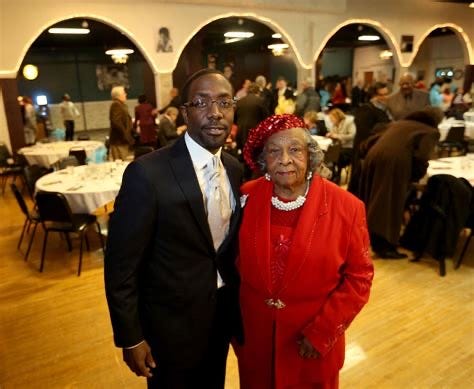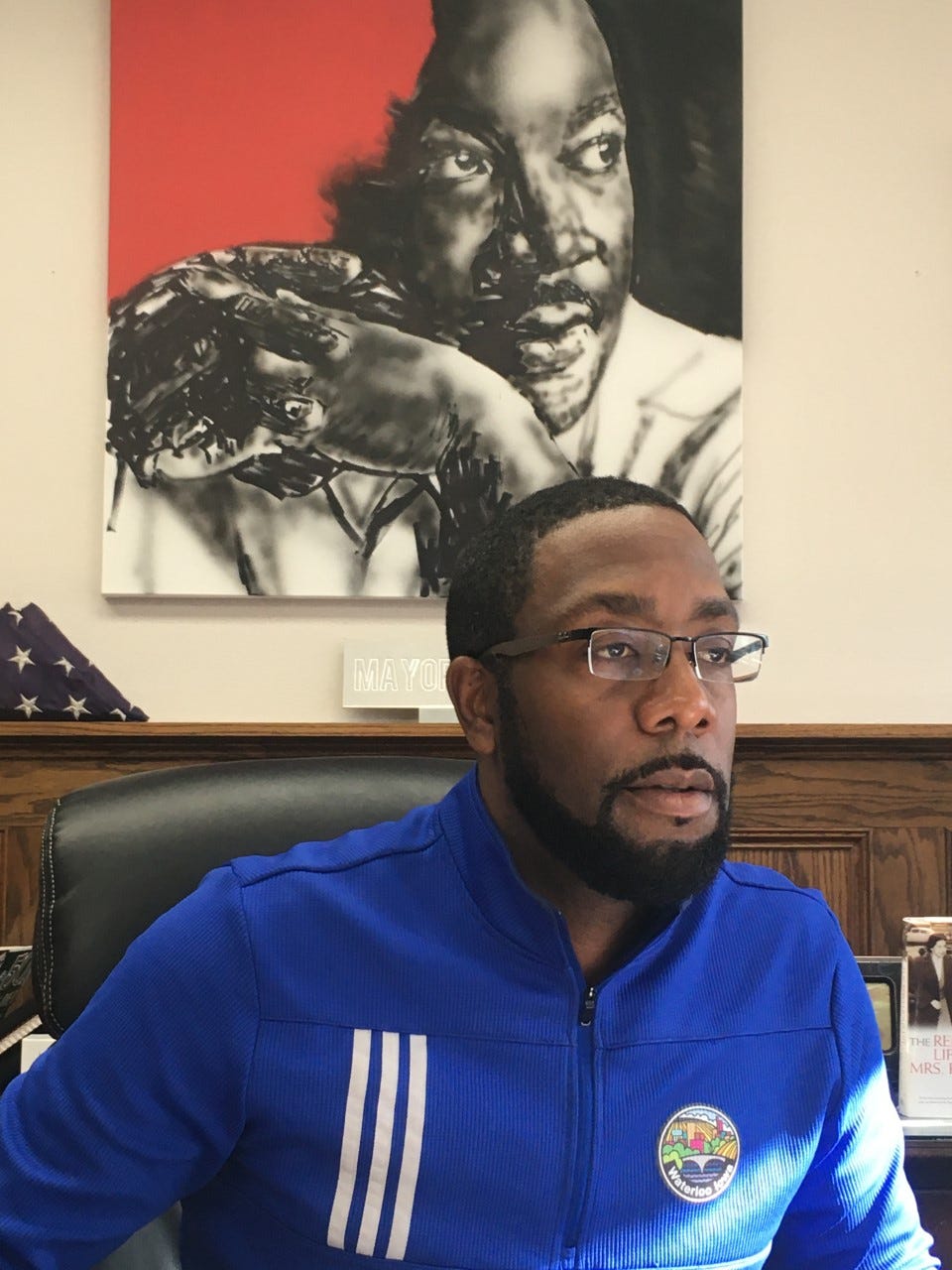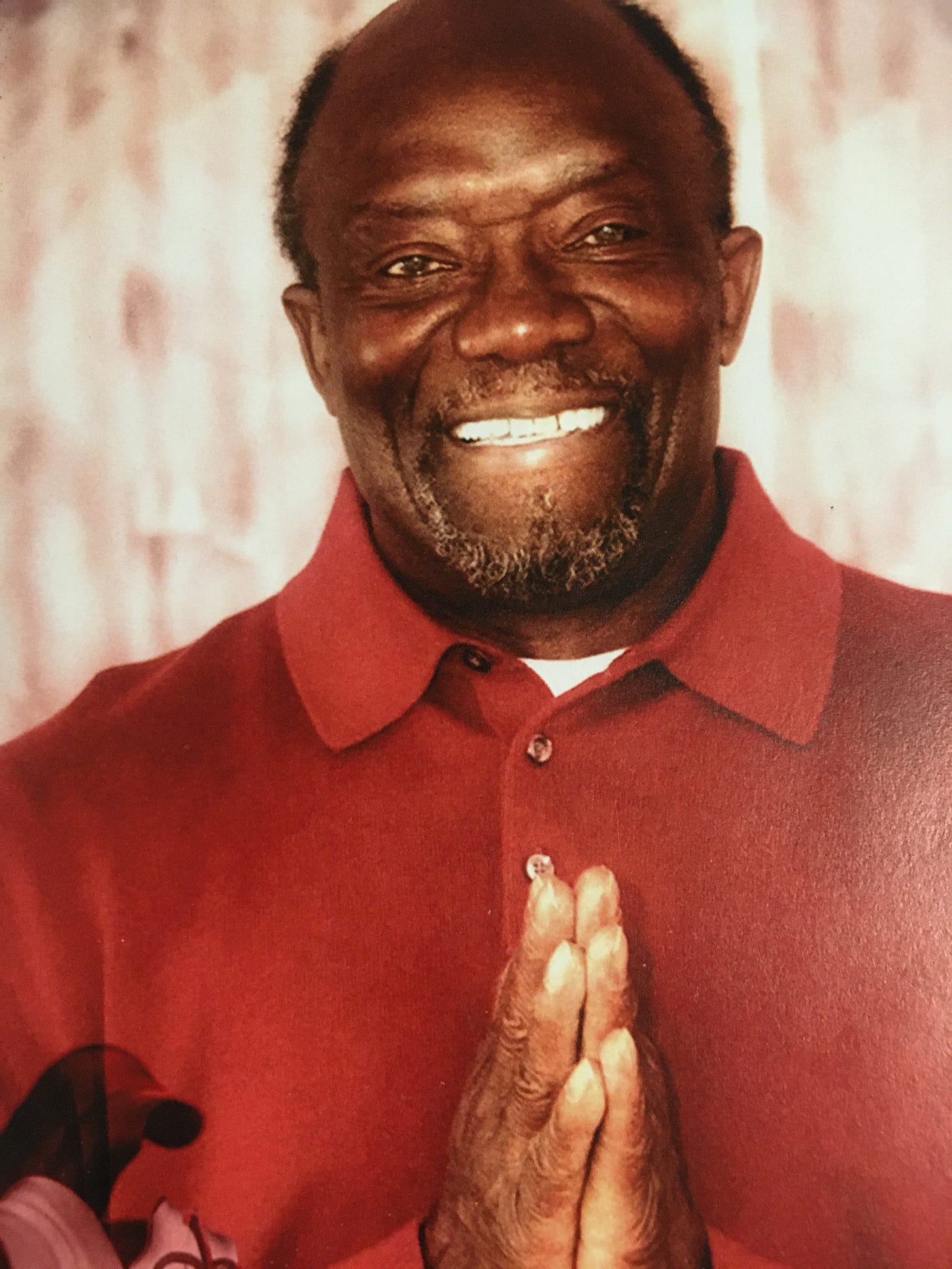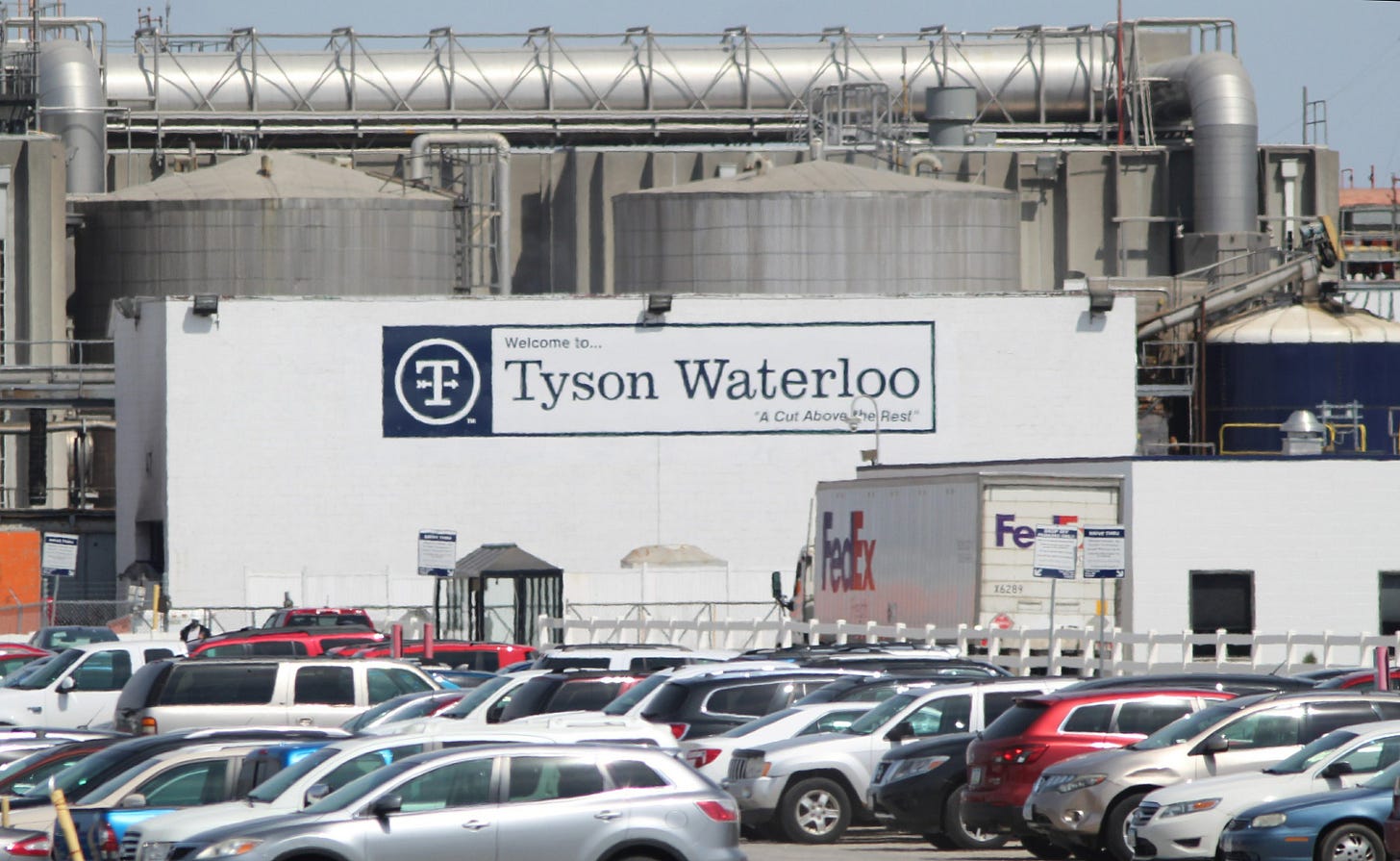The long and Hart of it
Waterloo mayor flirting with history again
Waterloo Mayor Quentin Hart is making history again – and not simply because he’s Waterloo’s first Black mayor.
He is now one of the longest consecutively serving municipal elected officials in the city’s history --- and possibly the longest ever.
With eight years on the City Council and eight years as mayor, Hart’s 16 consecutive years in city elected office is believed to be a record, at least as far back as records are available.
Late longtime council member Harold Getty -- whom Hart considers a mentor -- had 30 years in office dating back to the 1970s, but in nonconsecutive stints and not more than 12 years in one stretch.
“I never really knew about any consecutive terms. I’m just pleased to be able to serve,” the mayor said.
Hart, now 51, isn’t ready to announce whether he’s seeking re-election to the top spot at City Hall this year. However, only three mayors in the city’s history have served longer. Mayors Leo Rooff, his nephew John R. Rooff III and Ralph Slippy each had 10 years in office. Leo Rooff served in the 1970s and early ‘80s, his nephew served in the 1990s and early 2000s and Slippy served in the 1930s and ‘40s, through World War II.
If he does opt to seek a fifth-two year term, Hart will be vying to equal their mark and extend his own longevity in office.

"I never really stopped long enough to think about it," Hart said. "My goal was never to be the first Black mayor; my goal was never to be the youngest mayor or the longest serving mayor. Mine was to be the best mayor -- meaning, I would be able to stand on the shoulders of those who came before me and try to deal with age-old nagging problems we hadn't dealt with. But at the same time, push this community forward and try to help us to be a ‘Why not Waterloo?’ city, versus a ‘Why Waterloo?’ city. That's pretty much it.
"It really doesn't seem that long" that he's been in office, he said. "But I guess one day in a mayor's life is a week; one week is a month; and one month is like a year sometimes, just because of the diversity of situations we're faced with on a daily basis.
"But I don't look at this as a job, " Hart said. "I look at this as one of the greatest opportunities any human being could possibly have --- that is, to be able to serve the hometown and the place I've grown up in and the place that has given me so much. I feel like this is my purpose for this period of time in my life."

Hart is the elected chief executive officer of one of Iowa's most racially and culturally diverse cities. With a population of almost 67,000, Waterloo is the state's eighth largest city. While Des Moines has the state's largest Black population numerically, Waterloo has the highest percentage Black population in Iowa, at 17 percent, according to the most recent American Community Survey, with 28 percent Black enrollment in the Waterloo Community School District. Waterloo also is home to sizable Bosnian, Latino, Congolese and Burmese populations.
While Waterloo has held its own in population recently, it has never recovered from its sizable population loss during the 1980s farm crisis and recession when there were major layoffs at John Deere, the city's largest manufacturing employer. Deere has invested hundreds of millions in redeveloping its Waterloo facilities for decades and has been hiring of late.
Waterloo's population peaked at about 76,000 in the middle to late 1970s. The loss of population and tax base left lingering infrastructure issues, despite a major, mostly federally funded overhaul of the metropolitan highway system in the 1980s and early ‘90s.
In contrast, Waterloo's sister city, Cedar Falls, home to the University of Northern Iowa, has grown from just under 34,000 population in 1990 to more than 40,000 today. It is 2.7 percent Black and 4 percent Asian. the two towns make up the bulk of Black Hawk County's population of about 130,000.
In what was a largely de facto segregated, redlined city through the 1970s, Hart has been elected, and re-elected, with substantial support from throughout the entire community, not just the traditionally Black wards and neighborhoods on the city's east side. And, in electing Hart to a fourth term in 2021, Waterloo voters also elected the first Black majority City Council.
A trail was blazed for Hart's mayoral candidacy 36 years ago when the late Sammie Dell, a Vietnam veteran and, like Hart, an administrator at Hawkeye Community College, became the first Black elected to a citywide post in Waterloo municipal government. He was elected to an at-large council seat, running on then-Mayor Bernie McKinley's council ticket. Dell, in fact, pulled more votes than any of the mayoral candidates. Joining incumbent council member Willie Mae Wright, it was the first time two Blacks had served on the council at the same time. While at HCC, Hart received an annual “Commitment to Diversity” award named for Dell.
One doesn't have to be the smartest person to be mayor, Hart said —except maybe for some simple math. Longtime council member and mentor Wright half jokingly advised Hart, "Learn how to count to four!" when he first took office, referrng to the number of votes required for council approval of most measures. But, Hart said, having a good work ethic is essential to the job.

"It's the values I learned from my parents," he said. His father worked at Deere and his mother at Allen Hospital, now a UnityPoint facility.
"My dad was one of the hardest working human beings I've ever seen,” the mayor said. “He would come in early, work extra hours at John Deere to get me through college. My mom worked with so many different kinds of people and she had that diverse perspective, to treat everybody with respect," regardless of race or income level.
"This is not a job. This is a purpose," Hart said. "I get to wake up every morning and think about how I could work with people to make Waterloo a better place. So it's a blessing."
As a husband and father of three school-age and teenage children, Hart agreed with a statement made years ago by one of his predecessors, Mayor Leo Rooff, who said that to be mayor, one had to devote every waking moment to the job, except for a crisis in one's own family. Hart can relate to that observation.
"Recently, I just had the passing of my father, and my sister, and my uncle. And, it was time to grieve,” Hart said. “But people still had the expectation that the job is going to get done. My great team I work with on staff here still have the expectation that decisions will be made.
"I 100 percent accept that challenge,” Hart said. “I could be at a basketball game, a children's function, at a bathroom stall and come up to the stall next to me and ask questions about the city. Or I could be at church, at a funeral, and people come up and ask me about the job. I haven’t had a fully comfortable night's sleep maybe in about 15, 16 years. As soon as I was elected, the concerns and cares of this community became my priority. Being readily available to any situation, that's part of the job. It gives me purpose. I love what I do. Very thankful."
He chaired a City Council meeting just two days before his father's funeral, because, he said, "I still have a responsibility. And my dad would expect nothing less.
"To add to Leo Rooff's point -- and this is important to me -- I work for the citizens," Hart said, contrary some people's misperceptions of the trappings and powers of the office. "Sixty-eight thousand people don't work for me. I work for them."
Major challenges in his administration included a near-record flood in September 2016, less than a year after his election. But he had been on the City Council several years earlier during the record 2008 flood. He pitched in then, and many of the same city staff were still in place for both floods.
When longtime City Engineer Eric Thorson alerted him to the flood situation in 2016, "something clicked in side of me,” he said. “I started organizing our department heads. It just clicked. Experience in those situations does help, and having qualified staff that have been here. We're very fortunate to have a lot of experienced department heads. They've known a lot and seen a lot. But they're also acceptive of change. That keeps you young and vibrant, no matter how old you are in your position.
"The tough time for me personally as an elected official is the misinformation campaigns --- where you know people are not being truthful,” he said. “I can't get engaged in all those conversations. I have to continue to lead and serve this community. So I don't get into every argument. I don't do those things. It's about the greater good, about what's best for this community, versus what people's personal feelings are, and their attacks on me.”
But, he said, “I have an 11 year old daughter, teenage sons and a wife, people that I'm close to, that see the mistruths. That can be a challenge for them,” he said. “That's personal.
"Covid was impactful and that was a very tough time," he added. Several workers at the Waterloo Tyson Fresh Meats plant died from the virus; the plant closed for a while. A community task force of health, law enforcment offiicals and others responded.
“Seeing people close to me that have passed away from COVID-related symptoms, that was tough, and trying to lead at the same time,” Hart said. “Very fortunately I had incredible city staff, some council members who were supportive and impactful. It was a really great time to see this community come together for the greater good of all the citizens.
"The thing I notice about the city is that in the toughest times, from the flooding to COVID, I've been able to see greatness in action and people stepping up to serve the greater community," Hart said. "When we were preparing sandbags, no one asked in the line whether you were a Republican or a Democrat, whether you supported Quentin or you didn't. I saw people coming together to work for the greater good of this community."
He also praised "the front line staff of people during COVID” who “risked their own personal safety to provide goods and services; health care providers risking their own personal safety to help the sick and the shut in.”
Concurrent with COVID, and in response to local protests and calls for policing reform following the death of George Floyd in Minneapolis, in June 2020 Hart directed the Waterloo’s then-new police chief, Joel Fitzgerald, the city’s first Black chief, to draft a “change management plan” for the department. It included an overhaul of the department’s use-of-force policy. The new policy explicitly banned chokeholds, among other measures, changes which were adopted by City Council ordinance.
Fitzgerald resigned last August to take a position in Denver, Colo., after several other reported job searches. Controversies arose over the relative brevity of his tenure, as well as over removing the department’s 55-year-old griffin silhouette logo — originally intended to symbolize vigilance, but seen more recently by many as too closely resembling a Ku Klux Klan dragon.
Hart feels the comprehensive plan and reforms which were drawn up by the former chief and adopted by the council, while eclipsed at the time by those controversies, will have outlasting, enduring positive impact and should be celebrated.
One pending current challenge is housing. Hart praised the efforts of businesses and organizations like John Deere coming together with local Iowa Heartland Habitat for Humanity now with housing initiatives in areas such at the Church Row neighborhood on the near west side of downtown.
"You start to find out we're way more united than we are divided," the mayor said. The challenge, and the objective, he said, is to keep pointing out that underlying unity to the community at large, in good times as well as bad.
”Another challenge was that 24/7 Wall Street report that came up (in 2017) that said this is the worst place to live for African Americans,” Hart said. “That was heavy, right? Because we have a history of economic disparities, and discrimination and lack of opportunity in some instances. So the question is, how do you eliminate some of those barriers so that everyone can live here successfully? First, it’s understanding the problems and he challenges, and how they were created, and work to change those things.
”What’s that saying — ‘You can’t solve today’s challenges with the mindset that created them?’ “ Hart said. “It’s kind of been the approach we’ve tried to take here.”
A local nonprofit organization called the 24/7 Black Leadership Advancement Consortium, or “24/7 BLAC,” made up of Black educators and business professionals, has been formed to take a multi-pronged educational, entrepreneurial approach to those challenges.
Regarding local government’s role in those issues, Hart said, ”What I’ve been trying to do with my staff is to develop an equity mindset; an equity approach” in dealing with community and economic development to disadvantaged areas of the city. Simply spreading support evenly geographically, he said, doesn’t allow the disadvantaged areas to catch up.
”What we need in the same proportion, is respect for one another; that’s the equality we need,” Hart said. “But we need equity in our decision making. Because if we don’t, that gap is going to become wider and wider. Different wards (of the city) have different needs. We need to figure out how to give our wards exactly what they need. That’s been a challenge, but we’re trying.”
One area that’s been getting what it needs is downtown, he said, with many once-vacant storefronts occupied, the Waterloo Convention Center at Sullivan Brothers Plaza under renovation, new private apartment housing and growing large public events like Iowa Irish Fest.
The long-deliberated replacement of and improvements to some downtown bridges are under way, and further out, major improvements to Gates and Byrnes Parks are planned. And he said various museums, the Waterloo Center for the Arts and the Cedar Valley SportsPlex all help the quality of life.
”We just don’t give ourselves enough credit for what we do have,” Hart said, and the large infrastructure improvements like the bridges, the parks and the convention Center will all bear fruit down the road.
Others are taking notice beyond the city limits. “You wouldn’t believe, when I go to the U.S. Conference of Mayors, the level of respect Waterloo gets,” he said — as a community that punches above its weight. “They know Waterloo.”

Iowa Writers’ Collaborative Columnists
Laura Belin: Iowa Politics with Laura Belin, Windsor Heights
Doug Burns: The Iowa Mercury, Carroll
Dave Busiek: Dave Busiek on Media, Des Moines
Art Cullen: Art Cullen’s Notebook, Storm Lake
Suzanna de Baca Dispatches from the Heartland, Huxley
Debra Engle: A Whole New World, Madison County
Julie Gammack: Julie Gammack’s Iowa Potluck, Des Moines and Okoboji
Joe Geha: Fern and Joe, Ames
Jody Gifford: Benign Inspiration, West Des Moines
Beth Hoffman: In the Dirt, Lovilla
Dana James: New Black Iowa, Des Moines
Pat Kinney: View from Cedar Valley, Waterloo
Fern Kupfer: Fern and Joe, Ames
Robert Leonard: Deep Midwest: Politics and Culture, Bussey
Tar Macias: Hola Iowa, Iowa
Kurt Meyer, Showing Up, St. Ansgar
Kyle Munson, Kyle Munson’s Main Street, Des Moines
Jane Nguyen, The Asian Iowan, West Des Moines
John Naughton: My Life, in Color, Des Moines
Chuck Offenburger: Iowa Boy Chuck Offenburger, Jefferson and Des Moines
Barry Piatt: Piatt on Politics: Behind the Curtain, Washington, D.C.
Mary Swander: Mary Swander’s Buggy Land, Kalona
Mary Swander: Mary Swander’s Emerging Voices, Kalona
Cheryl Tevis: Unfinished Business, Boone County
Ed Tibbetts: Along the Mississippi, Davenport
Teresa Zilk: Talking Good, Des Moines
To receive a weekly roundup of all Iowa Writers’ Collaborative columnists, sign up here (free): ROUNDUP COLUMN
We are proud to have an alliance with Iowa Capital Dispatch.







I love learning about your town in these stories, Pat. Mayor Hart is one of the good people.